
Sean Plunket and Bryce Wilkinson on central bank mistakes
The Platform's Sean Plunket interviewed Bryce Wilkinson on his latest report How central bank mistakes after 2019 led to inflation. To read the report click here. Read more

Bryce is a Senior Fellow at The New Zealand Initiative and the Director of the Wellington-based economic consultancy firm Capital Economics.
Prior to setting up his consultancy in 1997, he was director, and shareholder in First NZ Capital. Before moving into investment banking in 1985, he worked in the New Zealand Treasury, reaching the position of Director.
Bryce holds a PhD in Economics from the University of Canterbury and was a Harkness Fellow at Harvard University. He is a Fellow of the Law and Economics Association of New Zealand.
Phone: +64 4 499 0790

The Platform's Sean Plunket interviewed Bryce Wilkinson on his latest report How central bank mistakes after 2019 led to inflation. To read the report click here. Read more

The Platform's Rodney Hide interviewed Bryce Wilkinson on monetary policy and his latest report How central bank mistakes after 2019 led to inflation. To read the report click here. Read more

It’s not so much Russia or COVID that caused inflation but central banks and the extraordinary stimulus they helped create. That’s according to a former Reserve Bank Governor who’s co-authored an excoriating review of the role Central Banks played in our current inflationary crisis. Read more

Claims the outbreak of inflation in many economies is due to mistakes made by central banks. It comes in the form of a new paper, co-authored by former governor of the Reserve Bank of New Zealand Graeme Wheeler, and the New Zealand Initiative's Dr. Bryce Wilkinson. Read more

The New Zealand Initiative has denounced the Reserve Bank, and other central banks for making what it says are serious mistakes which led to inflation getting out of control. The paper, released this morning, says central banks were too confident in their abilities, their policies, and their assumptions, and forgot what their core jobs were. Read more

Central banks globally have made serious monetary policy mistakes, and to restore credibility, they must acknowledge and correct those mistakes. Oliver Hartwich interviews co-authors Graeme Wheeler and Bryce Wilkinson about their new policy paper How central bank mistakes after 2019 led to inflation. Read more
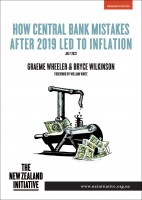
A research note released today by The New Zealand Initiative mainly attributes the outbreak of inflation in many economies to central bank mistakes. Co-authored by Graeme Wheeler, former Governor of the Reserve Bank of New Zealand, and Bryce Wilkinson, Senior Research Fellow at The New Zealand Initiative, the paper argues that central banks overall: were too confident about their monetary policy framework; were too confident about their models; were too confident they could control output and employment; lost their focus on price stability and took on too many mandates; faced conflicts in some cases with conflicting ‘dual mandate’ objectives; and were distracted by extraneous political objectives, such as climate change. Read more
New Zealand’s economic and social decline is slowly receiving greater recognition amongst journalists and commentators. The litany of woes is daunting. Read more
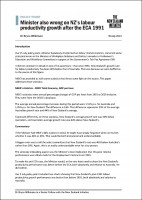
The New Zealand Initiative rebuts the Minister of Workplace Relations and Safety’s claim to a select committee that New Zealand’s labour productivity growth rate since 1991 was 46% below that of Australia. On figures recently supplied by the Ministry of Business, Innovation and Employment, the correct figure was 30%. Read more
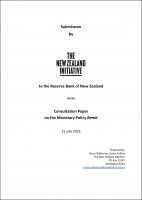
Read our submission, written by Dr Bryce Wilkinson to the Reserve Bank of New Zealand. This submission responds to the Bank’s 1 June 2022 consultation paper, Supporting New Zealand’s economic stability. Read more
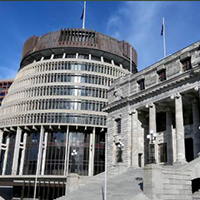
We in the Beehive are aware of some unfounded dissatisfaction amongst the great unwashed. There are stories of a health system in crisis. Read more

When Ministers appear before a Parliamentary Select Committee we do not expect them to make false assertions about factual matters. That is why we were shocked by what the Minister of Workplace Relations and Safety told the Employment and Workforce Select Committee last month. Read more

When expectations are low it is easy to be pleasantly surprised. Back in the 1980s, a school teacher once told me of a spontaneous surge of gratitude he had experienced towards a wayward pupil that morning. Read more
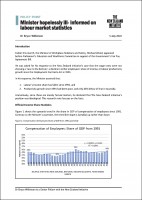
Last month, the Minister of Workplace Relations and Safety, Michael Wood, appeared before Parliament’s Education and Workforce Committee in support of the Government’s Fair Pay Agreement Bill. He was asked for his response to the New Zealand Initiative’s case that the wage rates were not showing a ‘race to the bottom,’ a decline in either employees’ share of income, or labour productivity growth since the Employment Contracts Act in 1991. Read more
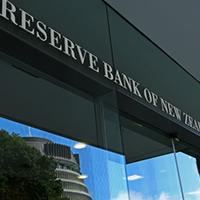
On Monday this week, the prime minister said she was optimistic that the economy would not shrink further in the second quarter. That would avoid New Zealand officially being in recession. Read more